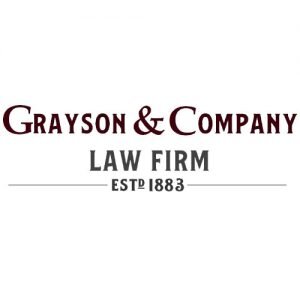Best Job Discrimination Lawyers in Moose Jaw
Share your needs with us, get contacted by law firms.
Free. Takes 2 min.
List of the best lawyers in Moose Jaw, Canada
About Job Discrimination Law in Moose Jaw, Canada
Job discrimination occurs when an employee or job applicant is treated unfairly or unequally in the workplace based on certain protected characteristics, such as race, gender, religion, age, disability, or sexual orientation. In Moose Jaw, Saskatchewan, as in the rest of Canada, employment discrimination is illegal under both federal and provincial human rights laws. The purpose of these laws is to ensure that everyone has equal access to employment opportunities and is protected from unfair treatment in the workplace.
Why You May Need a Lawyer
While some workplace disputes can be resolved informally, there are various situations where legal help is important. You may need a lawyer if:
- You believe you were denied a job, promotion, or other workplace benefits due to discrimination.
- You have been harassed at work based on a protected ground, such as gender, race, sexual orientation, or disability.
- You experienced retaliation or punitive measures after filing a discrimination complaint.
- Your employer has failed to accommodate a disability or religious practice.
- You need advice on how to document and report workplace discrimination.
- Your workplace discrimination complaint was disregarded or mishandled by your employer.
- You are considering legal action or filing a complaint with a human rights commission.
An employment lawyer can help you understand your rights, assess your situation, represent you in negotiations or proceedings, and increase your chances of reaching a positive outcome.
Local Laws Overview
In Moose Jaw, job discrimination is primarily addressed through two legal frameworks:
- Saskatchewan Human Rights Code: This provincial law prohibits discrimination and harassment in employment based on protected characteristics, including but not limited to race, gender, age, disability, religion, colour, ancestry, nationality, marital or family status, sexual orientation, gender identity, and receipt of public assistance.
- Canadian Human Rights Act: This federal law applies primarily to federally regulated workplaces (for example, banks, telecommunication companies, federal government, and transport) and provides similar protections.
Employers in Moose Jaw have a legal duty to provide a workplace free from discrimination and to accommodate employees’ needs short of undue hardship. This includes making reasonable adjustments for disabilities, religious observances, and other protected grounds. Employees who believe they have faced discrimination may file a complaint with the Saskatchewan Human Rights Commission or seek alternative dispute resolution or legal remedies.
Frequently Asked Questions
What is considered job discrimination in Moose Jaw?
Job discrimination involves unfair treatment in hiring, promotions, compensation, training, or other employment terms based on protected personal characteristics set out in the Saskatchewan Human Rights Code.
What characteristics are protected under Saskatchewan law?
Protected grounds include race, colour, ancestry, nationality, gender identity, sex, sexual orientation, age, religion, marital or family status, disability, and receipt of public assistance.
How do I know if I have experienced workplace discrimination?
If you were treated less favorably than others in similar situations because of a protected ground (e.g., denied a job, bullied, fired, not accommodated), you may have experienced discrimination.
How can I file a complaint?
You can file a complaint with the Saskatchewan Human Rights Commission. The process usually involves submitting written details of your experience and following their investigation and mediation procedures.
Does my employer have to accommodate my disability?
Yes. Employers must accommodate disabilities to the point of undue hardship. This includes making reasonable changes to the workplace or job duties if possible.
Can I be fired for filing a discrimination complaint?
It is illegal for an employer to retaliate against you for filing a discrimination complaint. If you experience retaliation, this is itself a violation of your rights.
Do I need a lawyer to file a complaint?
While not mandatory, a lawyer can help you prepare your case, understand your rights, and represent you during proceedings, increasing the chance of a successful outcome.
What deadlines apply to discrimination complaints?
There are deadlines to file complaints. Under Saskatchewan law, it is generally one year from the date the discrimination occurred, although exceptions may apply in rare cases.
What remedies are available if discrimination is proven?
Remedies may include compensation for lost wages, damages for pain and suffering, changes to workplace practices, and reinstatement of employment or other corrective action.
What if my employer is federally regulated?
If you work for a federal employer (banks, interprovincial transport, federal government), your complaint would be handled under the Canadian Human Rights Act by the Canadian Human Rights Commission.
Additional Resources
For those seeking more information or support regarding job discrimination in Moose Jaw, consider the following resources:
- Saskatchewan Human Rights Commission (SHRC): Handles discrimination complaints and provides information on rights and responsibilities.
- Canadian Human Rights Commission: Oversees federal workplace discrimination complaints.
- Public Legal Education Association of Saskatchewan (PLEA): Offers plain-language legal information and resources.
- Moose Jaw Legal Aid Office: Can provide eligible individuals with legal advice or representation.
- Employment Standards Division (Government of Saskatchewan): For concerns specifically related to workplace standards, pay, and treatment.
Next Steps
If you believe you have been subjected to job discrimination in Moose Jaw, here’s how to proceed:
- Document as much evidence as possible, including dates, names, emails, notes, and records of discriminatory actions or remarks.
- Consult with a lawyer or legal clinic for a case assessment. They can advise you on your rights, deadlines, and the strength of your claim.
- Contact the Saskatchewan Human Rights Commission to discuss filing a formal complaint.
- Consider seeking support from local community organizations for additional guidance and advocacy.
- If the situation is urgent or involves health and safety risks, report it to the relevant authority or seek immediate assistance.
Taking timely action is crucial. Qualified legal advice can help you navigate the complaint process and work towards a fair solution.
Lawzana helps you find the best lawyers and law firms in Moose Jaw through a curated and pre-screened list of qualified legal professionals. Our platform offers rankings and detailed profiles of attorneys and law firms, allowing you to compare based on practice areas, including Job Discrimination, experience, and client feedback.
Each profile includes a description of the firm's areas of practice, client reviews, team members and partners, year of establishment, spoken languages, office locations, contact information, social media presence, and any published articles or resources. Most firms on our platform speak English and are experienced in both local and international legal matters.
Get a quote from top-rated law firms in Moose Jaw, Canada — quickly, securely, and without unnecessary hassle.
Disclaimer:
The information provided on this page is for general informational purposes only and does not constitute legal advice. While we strive to ensure the accuracy and relevance of the content, legal information may change over time, and interpretations of the law can vary. You should always consult with a qualified legal professional for advice specific to your situation.
We disclaim all liability for actions taken or not taken based on the content of this page. If you believe any information is incorrect or outdated, please contact us, and we will review and update it where appropriate.









